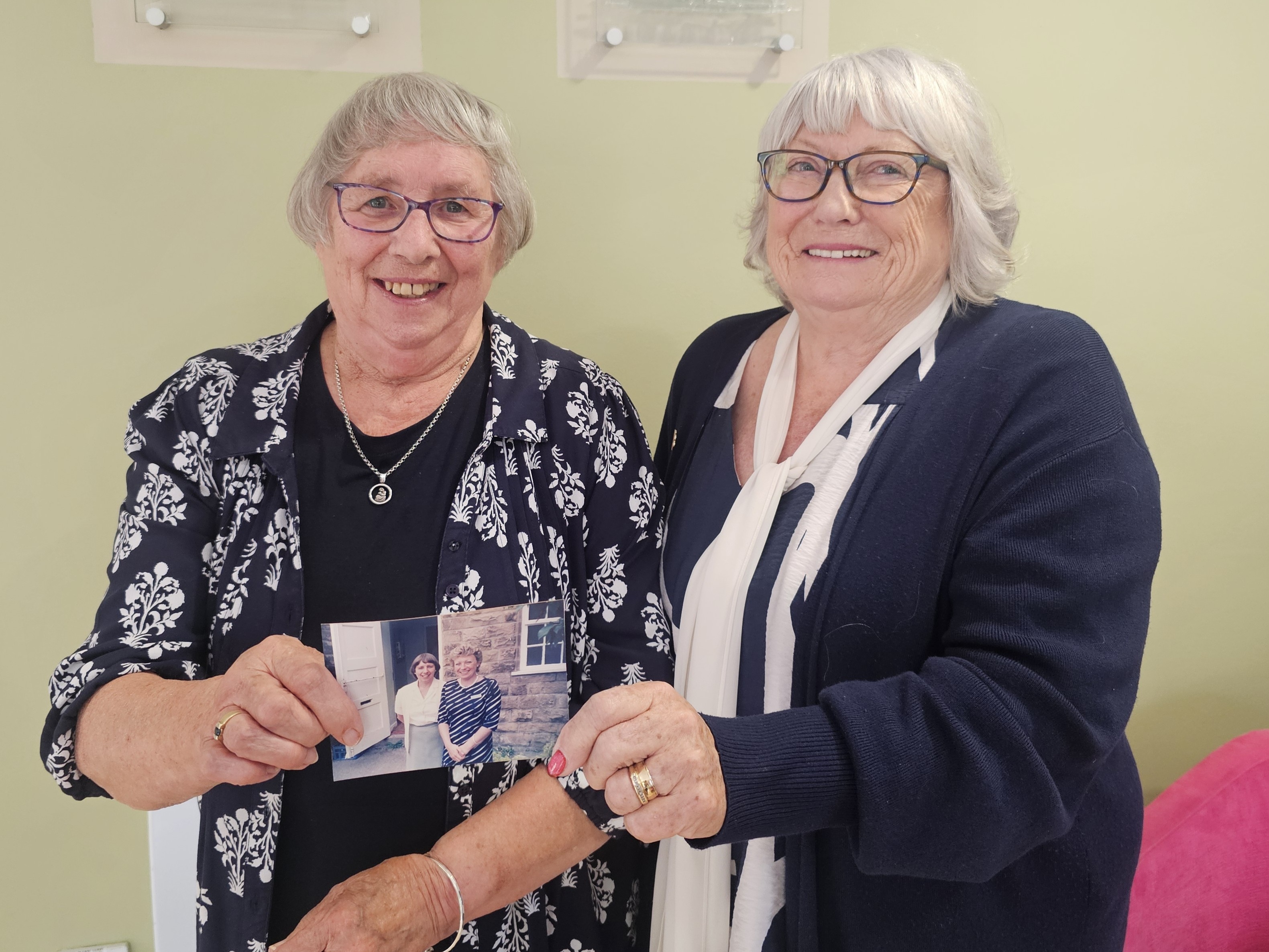At the end of October, St Luke’s Hospice hosted a special Papers to Patient (P2P) Celebration event, featuring reflections from Shelagh Bellamy and Gloria Day, two nurses who played a pivotal role in establishing the St Luke’s Day Hospice more than 50 years ago.
St Luke’s staff and trustees gathered to hear first-hand accounts of the challenges, triumphs, and lasting impact of pioneering hospice care in Sheffield and beyond.
Papers to Patients is a monthly St Luke’s Research forum that brings staff together to discuss key research and share insights to improve palliative and hospice care. This recent session explored a publication looking at the evidence behind establishing a day hospice, and cites St Luke’s as “the very first day hospice for patients with preterminal cancer and chronic disease.”
One of the key findings from this paper emphasises how the most effective day hospice models combine medical treatment with social and wellbeing support. This is a balance St Luke’s has championed for over five decades, through its holistic approach across both its Little Common Lane hospice and its Ecclesall Road South site, which connects people to Social Prescribing and practical, emotional, and community support alongside clinical care.
As the first modern hospice outside London, St Luke’s continues to be immensely proud of its pioneering role and lasting global influence on hospice care.
In the 1970s, Shelagh and Gloria worked closely together in the early years of St Luke’s inception. Drawing on their backgrounds as District Nurses, their tenacity, passion and compassion laid the foundations for the St Luke’s Day Hospice, which today supports thousands of people across Sheffield every year.
Shelagh’s journey to St Luke’s began as a District Nurse working alongside Tony Crowther, St Luke’s Medical Director at the time. During a six-month training course with a placement at St Luke’s, she identified a gap in care for patients who had been discharged home once their symptoms were managed - recognising the need for a day service.
It was during this course that Shelagh met Gloria, and the two went on to work together for 16 years.
“I was the very first person to start the course, and during that time, the idea and need for the day unit developed even more. After completing the course, I was seconded to St Luke’s indefinitely as the Liaison Sister, with the goal of setting up the day unit.”
“This was all completely new, so we were starting from scratch. We planned everything from documentation for the day hospice, looking at architect’s plans, to staffing and opening times hours - and everything needed to make this a success.”
“My job was to get out into the city and ‘sell’ the day unit - to explain what we could offer patients: things like hairdressing, showers, and giving families and caregivers that bit of respite too.”
However, gaining wider support in those early days wasn’t easy. District Nurses and GPs were sometimes sceptical about hospice care, with questions raised about patient transport, staffing and volunteer resources. In local press, St Luke’s - then known as St Luke’s Nursing Home - was even referred to as a “death house.”
Education during this time was critical to overcoming these barriers. Shelagh and Gloria became tireless advocates, speaking at conferences, leading educational courses, addressing Women’s Institutes and international visitors, all to help normalise and promote hospice care and gain acceptance among professionals and the public.
Ultimately, their persistence paid off. The initiative flourished, laying the foundations for the St Luke’s Hospice that is cherished across Sheffield today.
Shelagh reflected: “Back then, nobody knew what a hospice was, and when we met patients and families, we were met with fear. Perceptions of hospice care have changed drastically since then, but there will always be a fear of death. That will never go away, but what we can do is we can listen, and be there when people need us.
Gloria added: “My forte has always been talking to people, but through St Luke’s I learned a very valuable lesson - that silence is golden. It’s about the power of listening and allowing patients to speak for themselves, when they are ready. The focus is on holistic care, listening, and compassion, rather than solely medical interventions.”
Reflecting on the success of the event, St Luke’s Research and Innovation Manager, Clare Pye said: “This was an incredible opportunity to reflect on one of our very important pioneering services that remains a huge success today. We are extremely grateful to Shelagh and Gloria for joining us and sharing their inspirational reflections.
“St Luke’s remains a centre of excellence and a driving force of research and education today, so it was wonderful for our current nursing staff to meet two of our early pioneers and share in the same values established almost 55 years ago.
“This commitment to research and education is now being taken even further through the launch of the St Luke’s Wilkes Institute. The Institute will build on our pioneering legacy, founded by Eric Wilkes, by driving forward new evidence-based research, impactful education and income generation from sharing our expertise that will shape the future of palliative and end-of-life care locally and nationally.
“Shelagh and Gloria’s passion always stemmed from the patient – that compassion never wavered, and it continues to drive us forward for the next 55 years and beyond.”

(L - R) Gloria Day and Shelagh Bellamy
-celebration-event-96842633-2f75-4e0c-9401-a6e8844251b6.jpg?Status=Master&sfvrsn=774e79c8_3)
Papers to Patient (P2P) Celebration event October 2025